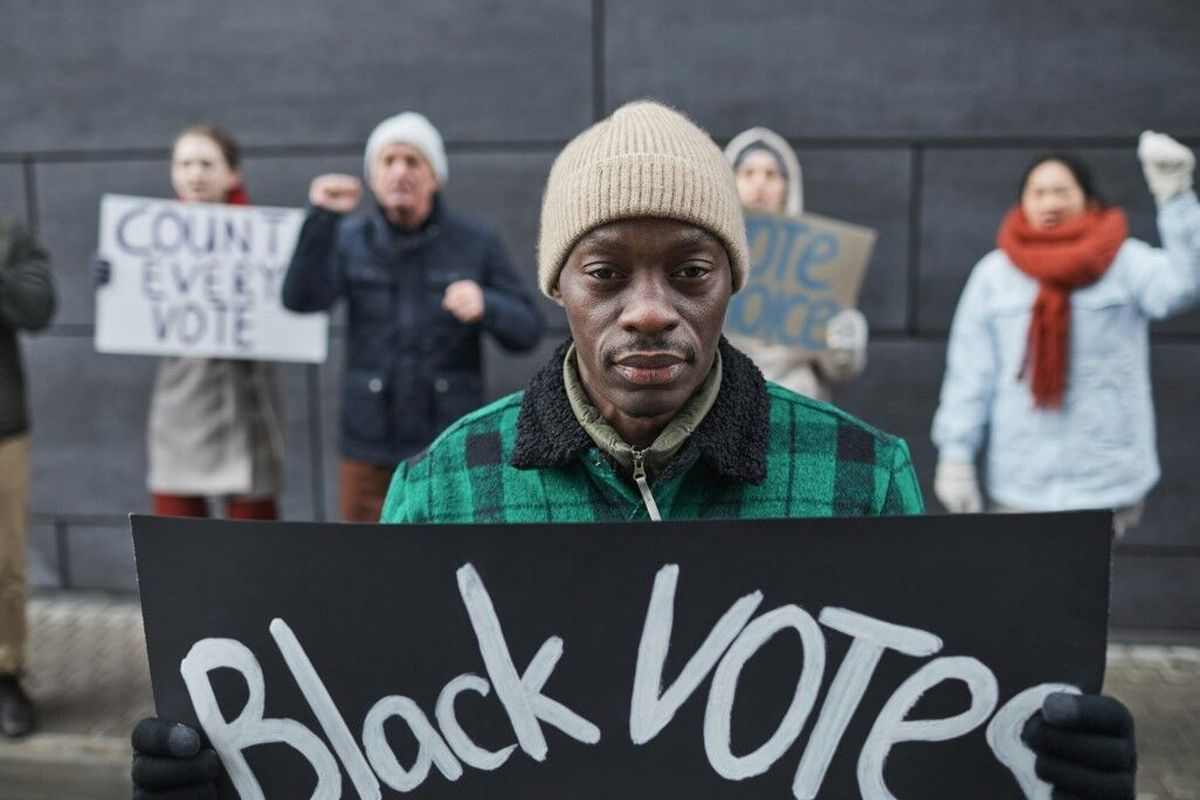The momentous legislative rights acquired during the Voting Rights Act of 1965 removed barriers that prevented Black Americans from voting. Voter suppression tactics have been a dirty little trick since the muscle behind our vote was realized and became a threat to the American power structure. The Voting Rights Act of 1965 paved the way for us to exercise our democratic and constitutional rights, ensuring that Black Americans not only have a seat at the table, but a voice.
In 2024, we are choosing not between Candidate A or Candidate B, but between our inalienable rights and the removal of policies that provide access to resources that are the straps on the boots that we are often told to pull ourselves up from.
The short-sighted myth of American Exceptionalism has overlooked segments of American society where exceptional just does not feel tangible. Places like Flint, Michigan, where there is still a clean water and lead pipe crisis. Or Buffalo New York, where Payton Gendron shot 13 Black patrons of a local grocer, 10 of whom were killed, in an act of domestic terrorism, with racial epithets and White nationalist rhetoric decorating the assault weapons that he had been cleared to purchase via a background check. Or in Florida, where, just in May of this year, Robert Fortson, a 23-year-old Senior Airman in the United States Air Force, was murdered in his own apartment by a Sheriff’s deputy when he answered a strange knock at the door, and as he exercised his 2nd amendment right in his own residence, was shot dead. This was a young Black man whose job was literally to defend the constitution of the United States. Or in states where Black farmers are unable to access USDA programs, to include direct loan programs that, in 2022, of the 36% of loan applicants who were Black, 16% of these Black farmers were rejected, in contrast to 72% of White farmers who were able to access the same loans, wherein only 4% were denied. Or in Jackson, Mississippi, where, for decades, inadequate maintenance and poor funding have created an environmental crisis where, in 2022, the largest water treatment plant in the state failed, leaving 160,000 people without safe drinking water, if they had any water at all. This included hospitals, fire stations, and schools. This is in an area where 80% of residents are Black and about 25% live in poverty and exemplifies generations of neglect by politicians and policymakers.
The lie of the U.S. Supreme Court ruling Plessy vs. Ferguson in 1896 further fueled the monetization of our human rights, increasing the racial wealth gap that we still, in many segments of society, feel the reverberating effects of. A visit to Black communities in the rural South of that time would be all that was needed to know that equal did not accompany separate in most cases. And that decision codified institutional oppression. There has been a strategy in operation for a very long time. Capitalism and greed undergirded the oppression of Black Americans and other marginalized communities propelled by institutionalization of colonizer ideologies that have been cleverly shaped into white supremacy, still around to corrupt the institutions meant to protect all citizens. No, the playing field is still not even, despite false equivalencies that suggest it is.
We are at a tipping point, reminiscent of the 1960s. This upcoming election has life altering implications at play. We cannot turn a blind eye to this turbulent political climate in complicity; political violence is a threat to us all. We are America’s conscience. Systemic oppression upheld by racialized capitalism, perpetuated through fear, misinformation, reliance on compliance, and indoctrination of people not to question, challenge, or hold accountable the politicians responsible for representing the constituency is the behavior of betrayal. This is a true threat. Political bullying is the converse of democracy. What we saw unfold on Jan. 6, 2021, in the nation’s capital, would not have been tolerated if the perpetrators were different. But the label of “patriot” has taken a vainglorious trajectory that depicts America inaccurately; lest we forget that 60 years really was not that long ago.
We the people have the power to make this country equitable and accessible for all, especially Black Americans. We have the right to demand equitable policies for our benefit; what benefits Black people will benefit all people. We have the power to ensure this country will not fall under corruption, but will continue the struggle towards true liberty, justice, and equality. We hold that power and exercise it through our right to vote.
The Black vote has historically been manipulated to prevent our contribution to transform systems. When we vote, we hold politicians accountable to ensure there are no second-class citizens. This is a critical election year. So, vote! While all eyes are on the presidential election, the importance of voting locally – for school boards, city councils, mayors, judges, and governors – cannot be overstated. These are the people whose decisions impact our daily lives. So, vote!
We have an opportunity to make history like our foremothers and forefathers. We stand on the shoulders of ancestors who walked by faith and not by sight. They did not know when their efforts would be realized, but they persisted, regardless. Despite their differences, they took their civic duty seriously. Our unity is our flex and the biggest threat to greed, marginalization, erasure, and divisive manipulation. As we approach the election, remember the power we hold and our collective responsibility to ensure progress and the prevention of regression. Our right to vote should not be taken for granted but should be utilized for demanding change, holding those in power accountable, and shaping a future where liberty, justice and equity are realities for all.
Priya Osborne is the local NAACP Youth Council Advisor and the Director of Student Success, Equity & Diversity at Spokane Community College.
